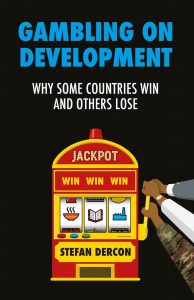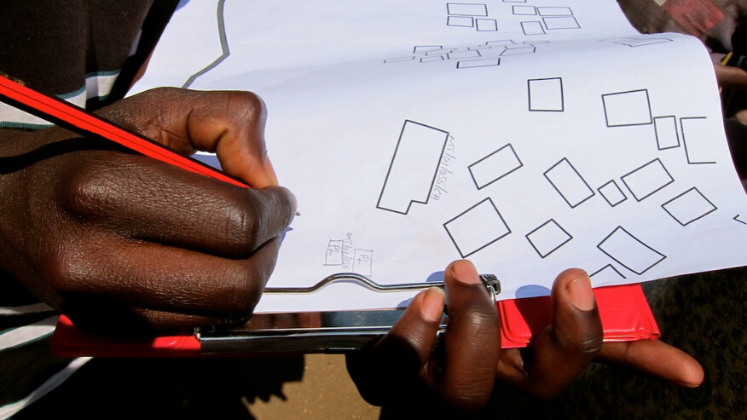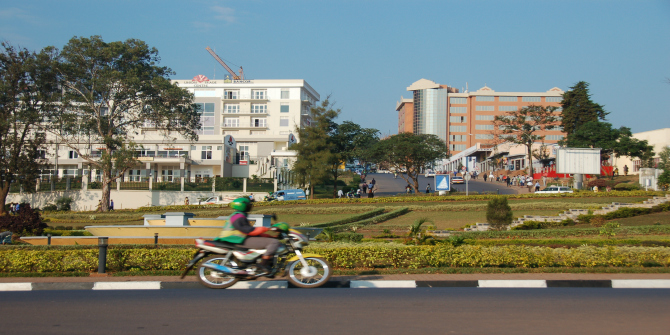In Gambling on Development: Why Some Countries Win and Others Lose, Stefan Dercon explores how elite bargains in some countries evolve into ‘development bargains’ that enable economic and developmental take-off. Duncan Green recommends this nuanced and well-written book.
The original version of this review was published on From Poverty to Power.
Gambling on Development: Why Some Countries Win and Others Lose. Stefan Dercon. Hurst. 2022.
 Ah, the summer reading backlog. A hammock, sunshine (lots of it) and some good books. Top of my reviews list was Gambling on Development: Why Some Countries Win and Others Lose by Stefan Dercon.
Ah, the summer reading backlog. A hammock, sunshine (lots of it) and some good books. Top of my reviews list was Gambling on Development: Why Some Countries Win and Others Lose by Stefan Dercon.
Dercon is a big name, former chief economist at the UK Department for International Development (DFID), a professor at Oxford and, until recently, a policy adviser to the UK Foreign Secretary. Which means he’s also an insider in a lot of rooms when big decisions were being taken. This isn’t a tell-all – he is usually pretty discreet – but it’s still a fascinating account.
I started off predisposed to scepticism, but ended up being 80 per cent won over. Why sceptical? Because I have read too many books and papers where economists say ‘wow, I’ve just discovered this thing called politics – let me explain it to you.’ But Dercon goes well beyond econo-splaining, making a good faith effort to bring together economics and politics into a coherent whole.
Happily, most of the book is not about aid (we’ll get to that later) but a discussion of the nature of the ‘elite bargain’ in the countries Dercon knows best, and why/how some elite bargains evolve into ‘development bargains’ that lead to economic and developmental take-off.
For Dercon, this is about how the (mainly) big men divide up power and the spoils of rule, and when/how they move to a more-long term vision, submitting to institutions, the rule of law and the needs of the wider economy rather than just grabbing what they can and heading for the nearest airport.
His big idea, while hardly new, is important: ‘A development bargain is a specific form of elite bargain, one of many possible ones. It is an agreement among those with power that growth and development should be pursued, even if they disagree over policy details. Countries with a development bargain tend to have three features in common: 1) the politics of the bargain are real and credible, not just some vague official statement or announcement; (2) the capabilities of the state are used to achieve the goals of the bargain, but, importantly, the state avoids doing more than it can handle; and (3) the state possesses a political and technical ability to learn from mistakes and correct course.’

Image Credit: Photo by Heather Gill on Unsplash
How do such development bargains come about? Crises, ‘legitimacy-seeking behaviour by those in power’ and enough stability to ensure elites are able and willing to take a long-term view and wait around to reap the rewards of investment and growth.
Dercon’s country typology is quirky, slightly chaotic and not always convincing, but definitely fun. To give just some examples, we have lion states that have ruthless, concentrated power behind a development bargain (such as Rwanda and Ethiopia); peacock states with a ‘spindly bird’ underneath the big feathers (India); hyena states that are scavengers fighting over scraps (South Sudan, Afghanistan); and tigerfish states where the big fish gobble up the little fish (Nigeria, DR Congo).
I liked Dercon’s nuance, his lack of academic obfuscation as well as his focus on the economy and private sector (when he travels, he seeks out businesses from Somaliland to South Africa and delves deeply into their experiences of development). He has a good eye for politics and always asks pertinent questions.
But (isn’t there always?) – two things grated. Firstly, the elitism. The people in all these countries rarely make an appearance, except as grateful recipients of the development bargain or (very occasionally) holding decisionmakers to account. I wanted more Marxism, more tides in the affairs of men, big norm shifts and political currents, to complement Dercon’s focus on transactional politics.
Second, while Dercon does his best to say that elites have agency, that not everything is pre-determined by history and structure, he struggles to explain how such agency arises. Part of the problem is that he stops digging too soon, settling for a description of the differences between countries and contexts and falling short in terms of explanations.
In this, I think he slightly reverts to type: economics is difficult, mathy stuff for grown-ups; politics is just common sense and good conversations with insiders. In the aid section he proposes ‘asking a simple question to assess aid spending in a country: how much more likely will it be that a development bargain emerges or will be strengthened [by the proposed aid programme]?’ Simple?
Which brings us to his reflections on what this understanding of development means for aid agencies like those he has advised. I liked this final section a lot – a real awareness of the limitations of what aid can achieve, and of the primary role of national and local politics in shaping that. To this he adds some sensible thoughts on the role of aid in delivering global public goods on climate change, tax evasion and the arms trade.
He argues that aid should mainly ‘work with the grain’ where there is a development bargain, helping those elites deliver. Where such a bargain appears to be emerging (though nothing is certain), donors should be willing to gamble (hence the title) – backing bits of emerging development bargains (pockets of state effectiveness, committed leaders, etc).
But Dercon comes unstuck where, to be honest, the aid sector always comes unstuck – what do in the hyena and tigerfish states, the ‘fragile and conflict affected contexts’. He has some sensible words on what not to do: don’t give up and revert to countries with functioning states, but then he falls back on technical assistance and the standard aid repertoire of cash transfers, vaccinations, etc.
Fair enough: everyone struggles to find ways to help poor people and communities in countries with predatory states. But I feel that Dercon’s focus on state elites perhaps blinds him to some alternative approaches that are worth trying – working with faith groups, civil society organisations or traditional/customary structures of power, where it might be possible to get things done, even while presidents and leaders are busy looting.
Overall, Gambling on Development is a brilliant, well written and important book. Thoroughly recommended.
Note: This review gives the views of the author, and not the position of the LSE Review of Books blog, or of the London School of Economics and Political Science.








5 Comments